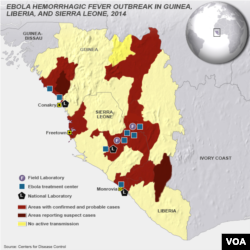The Ebola virus is spreading exponentially in Liberia, the World Health Organization said, predicting thousands of new cases there in the coming weeks.
The agency said Monday the number of new Liberian cases is moving far faster than the capacity to manage them.
Liberia already accounts for about half of all cases and deaths of Ebola in West Africa. The disease has killed more than 2,000 people, spreading from Guinea to Sierra Leone, Liberia, Nigeria and Senegal.
The WHO said that, with few free beds for treating Ebola patients in Liberia, some infected people are traveling across the capital in search of a treatment center.
In another development Monday, the United States and Britain said they plan to send military personnel and equipment to West Africa to help set up new treatment centers.
The Pentagon said military personnel will set up a 25-bed field hospital in Liberia's capital, Monrovia, for infected health care workers. Britain's military said it will open a 62-bed treatment facility in Sierra Leone, near the capital, Freetown.
Also Monday, hospital officials in the southern U.S. city of Atlanta say a fourth American who contracted Ebola in West Africa is expected to arrive in the Untied States Tuesday to receive care.
The patient, who was not named, will arrive by air ambulance at Emory University Hospital, where two other aid workers successfully recovered from the disease. A third patient, a U.S. doctor, is being treated in a Nebraska hospital, where on Monday his family said he was able to eat breakfast for the first time since falling sick.
U.S. calls for international response
On Sunday, President Barack Obama called for the international community to help combat the Ebola crisis in West Africa, where he said a lack of public health infrastructure has led to the spread of a "containable problem."
Obama told NBC News that U.S. military assets are needed to set up isolation units and equipment and to provide security for international health workers.
"If we don't make that effort now, and this spreads not just through Africa but other parts of the world, there's the prospect then that the virus mutates, it becomes more easily transmittable," the president said.
Dealing with the Ebola outbreak should be a national security priority for the United States, the president said.
The Ebola outbreak has killed more than 2,000 people, mostly in Guinea, Liberia and Sierra Leone.
Liberia would welcome U.S. aid
Liberian Defense Minister Brownie Samukai told VOA his country looks forward to any U.S. assistance, saying that Liberia's economy is "at a standstill" and that it is challenging for the country to provide its citizens basic health care.
He approved of setting up field hospitals to treat any health care workers who might get infected in the line of duty. "At least they would have a place to go to be easily treated," the defense minister said.
African Union officials held an emergency meeting Monday in Addis Ababa to discuss how to respond. It included discussion of the effects of closing borders and suspending flights to the affected countries.
AU chairman Nkosazana Dlamini-Zuma stressed the need for public health education and efforts that do not "fuel stigmatization and isolation."
Experimental vaccine shows promise
Meanwhile, new studies indicate an experimental Ebola vaccine, which is being tested on monkeys, can work for five weeks or up to 10 months if used in conjunction with a booster shot.
In a study published Sunday in the journal Nature Medicine, researchers from the U.S. National Institutes of Health (NIH) say the experimental vaccine regimen produced durable immunity against the deadly virus.
Researchers say a single dose of the vaccine protected all four test monkeys when exposed to Ebola five weeks later. They said half were protected when exposed to the virus 10 months after vaccination.
However, in tests on a separate group of monkeys, scientists say a booster shot, given two months after the initial vaccination, extended protection for all vaccinated monkeys for up to 10 months.
The vaccine tested by the NIH is similar to one being developed by drugmaker GlaxoSmithKline.






